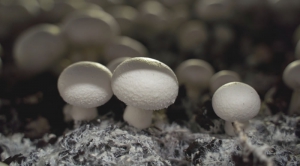Mushroom Life Cycle Assessment
Feb 28,
2026
Gentle on the Planet
Stakeholders across the food product supply chain are increasingly interested in understanding the environmental effects of food production. Mushrooms have a unique growing process unlike any other produce item and are considered “one of the most sustainably produced foods in the United States1.” Consider this:
- They are grown in the absence of sunlight in a climate-controlled environment.1
- One pound of production requires only 1.8 gallons of water; 1.0 kilowatt hours of energy; generates only .7 pounds of CO2 equivalent emissions.1
- Up to 1 million pounds produced on just 1 acre.1
A 2018 study2 published in the International Journal of Life Cycle Assessment looked at the cradle-to-gate life cycle environmental impacts of mushroom production in the United States from cultivation to harvest and preparation for bulk packaging. The goal was to create a “baseline” estimate of energy use, global warming potential (GWP), water use, and other common environmental impacts.
Please read the full article here.






















